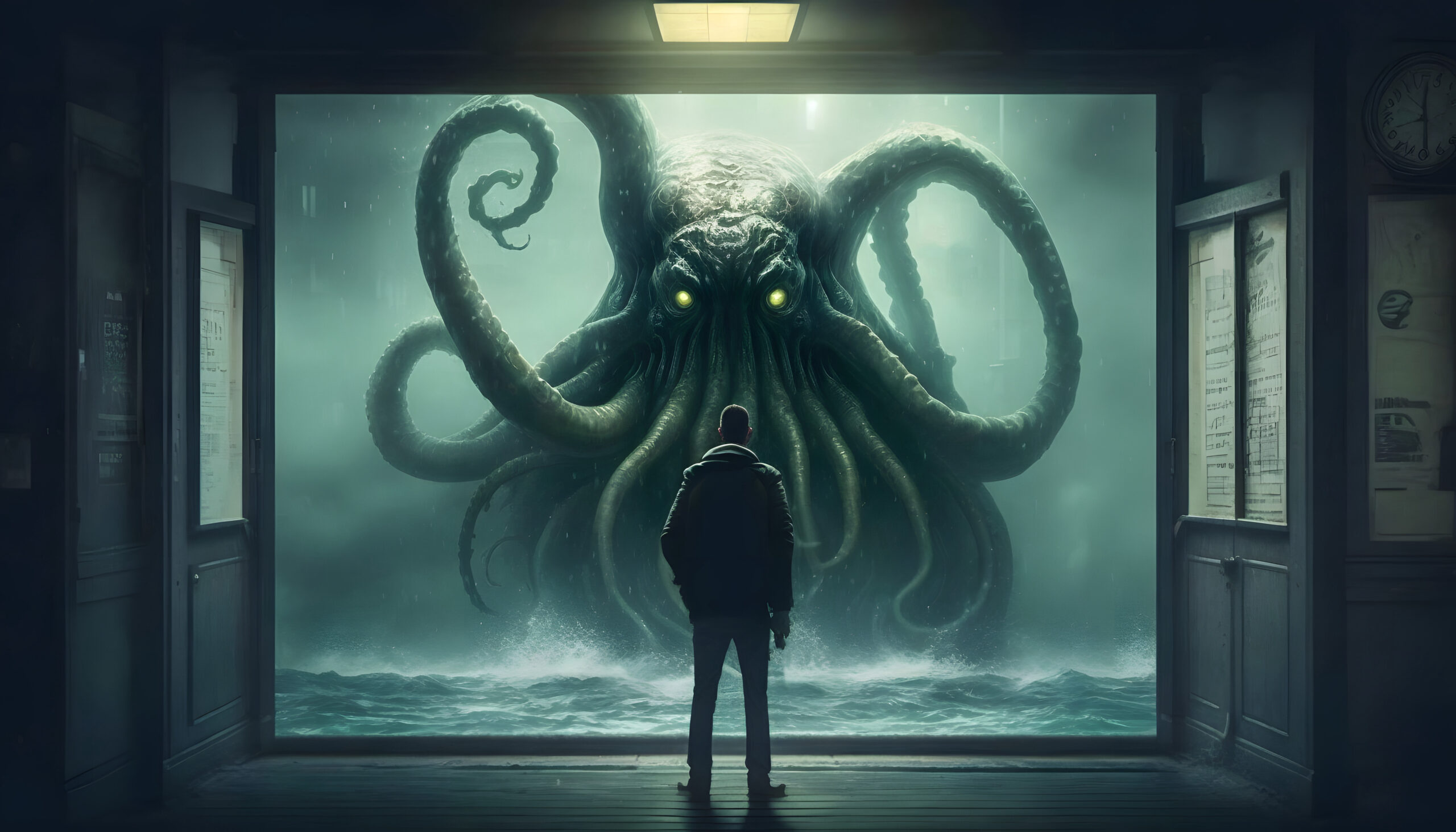H.P. Lovecraft

In the vast literary landscape, there exists a realm where the ordinary laws of reality dissolve, and the mind is plunged into the abyss of cosmic terror. This is the domain meticulously crafted by Howard Phillips Lovecraft, commonly known as H.P. Lovecraft, whose unique blend of horror and cosmic awe has left an indelible mark on the genre. Through his tales of ancient gods, forbidden knowledge, and incomprehensible horrors lurking beyond human perception, Lovecraft pioneered what would later be termed as “cosmic horror,” influencing generations of writers, filmmakers, and artists.
Born on August 20, 1890, in Providence, Rhode Island, Lovecraft’s upbringing was marked by tragedy and isolation. His father suffered a mental breakdown and was confined to an institution when Lovecraft was just three years old. Raised by his mother and aunts, Lovecraft found solace in literature, particularly the works of Edgar Allan Poe and Lord Dunsany, whose fantastical tales ignited his imagination.
Lovecraft’s early years were fraught with illness and economic struggles, which forced him to forgo formal education beyond high school. Nevertheless, his voracious appetite for learning led him to become a self-taught polymath, delving into subjects as diverse as astronomy, chemistry, history, and literature. These eclectic interests would later manifest in his writing, imbuing his stories with a sense of erudition and depth rarely seen in pulp fiction of the time.
It was in the 1920s that Lovecraft began to produce the stories that would define his legacy. Drawing inspiration from his nightmares, as well as his fascination with ancient civilizations and the cosmos, Lovecraft crafted a mythos populated by eldritch entities, forgotten cities, and forbidden tomes of knowledge. Central to his mythos was the concept of “cosmic indifferentism,” the idea that the universe is vast, indifferent, and fundamentally incomprehensible to the human mind—a notion that resonated deeply with his own existential anxieties.
One of Lovecraft’s most enduring creations is the pantheon of cosmic deities known as the Great Old Ones, including iconic entities such as Cthulhu, Nyarlathotep, and Azathoth. These ancient beings, whose motives and origins are beyond mortal understanding, serve as harbingers of cosmic doom, lurking in the dark corners of the universe, waiting to reclaim what was once theirs.
Central to Lovecraft’s narrative style is the use of “weird fiction,” a genre characterized by its focus on the uncanny, the inexplicable, and the macabre. Rather than relying on traditional tropes of horror, such as vampires or werewolves, Lovecraft’s stories evoke a sense of existential dread by confronting readers with the vastness of the cosmos and the insignificance of humanity in the face of its mysteries.
One of the hallmarks of Lovecraft’s writing is his use of “cosmic horror,” a subgenre that emphasizes the insignificance of humanity in the face of incomprehensible cosmic forces. Unlike traditional horror, which often relies on supernatural elements or human villains, cosmic horror presents a universe where humanity is but a speck of dust in the vastness of space, utterly powerless against forces beyond its comprehension.
At the heart of Lovecraft’s cosmic horror is the concept of “fear of the unknown,” the idea that the greatest terror lies not in what we can see and understand, but in what remains hidden and unknowable. In Lovecraft’s universe, knowledge itself is a source of terror, as the pursuit of forbidden truths inevitably leads to madness and destruction.
Lovecraft’s influence extends far beyond the realm of literature, permeating popular culture in myriad ways. His creations have inspired countless authors, filmmakers, and artists, from Stephen King to Guillermo del Toro, from H.R. Giger to Metallica. Lovecraftian themes can be found in films such as Ridley Scott’s “Alien,” video games like “Bloodborne,” and even tabletop role-playing games like “Call of Cthulhu.”
However, Lovecraft’s legacy is not without controversy. His works have been criticized for their racism, xenophobia, and anti-Semitism, which are evident in his portrayal of non-white and immigrant characters as degenerate and subhuman. While some argue that Lovecraft’s prejudices were a product of his time and upbringing, others believe that they are inseparable from his work and tarnish his otherwise formidable legacy.
Table of Contents
ToggleDespite these criticisms
Lovecraft’s influence on the horror genre remains undiminished. His tales of cosmic terror continue to captivate readers with their otherworldly imagery, existential themes, and unparalleled sense of dread. In a world where the boundaries between the mundane and the monstrous are constantly shifting, Lovecraft’s stories remind us of the terrifying truth that lies beyond the veil of reality: that we are not alone, and that our universe is far stranger and more terrifying than we can ever imagine.
Conclusion
H.P. Lovecraft stands as one of the most influential and enigmatic figures in the history of horror literature. Through his pioneering work in cosmic horror, he has challenged our perceptions of the universe and our place within it, leaving an indelible mark on the genre that continues to resonate with readers and creators alike. Lovecraft’s legacy is a testament to the power of imagination, the allure of the unknown, and the enduring fascination with the darker aspects of the human psyche.




